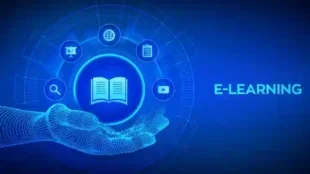In today’s fast-paced digital age, traditional learning methods are being rapidly transformed by the advent of e-learning. With the proliferation of technology and widespread internet access, e-learning has become a game-changer, revolutionizing education and training across various industries. In this blog post, we will explore the incredible power of e-learning and the numerous benefits it offers to learners worldwide.
- Flexibility and Accessibility: One of the greatest advantages of e-learning is its flexibility and accessibility. Learners can access educational resources and courses anytime, anywhere, and at their own pace. Whether it’s a full-time professional seeking to enhance their skills or a student balancing multiple commitments, e-learning provides the convenience and freedom to learn at one’s own convenience. This flexibility allows individuals to juggle work, personal life, and education simultaneously, eliminating geographical barriers and making learning accessible to a global audience.
- Personalized Learning Experience: E-learning platforms often utilize advanced technologies such as artificial intelligence and machine learning algorithms to personalize the learning experience. These platforms can adapt to individual learning styles, preferences, and pace, ensuring that learners receive tailored content and support. By catering to each learner’s unique needs, e-learning enhances engagement, motivation, and knowledge retention, leading to more effective learning outcomes.
- Diverse Learning Resources: E-learning opens up a vast array of learning resources, including multimedia content, interactive quizzes, virtual simulations, and discussion forums. These resources go beyond traditional textbooks, enabling learners to engage with diverse content formats that cater to different learning styles. Furthermore, e-learning platforms often provide access to a wide range of courses, allowing learners to explore various subjects and expand their knowledge horizons.
- Collaborative Learning Opportunities: Contrary to popular belief, e-learning doesn’t have to be a solitary experience. Many e-learning platforms offer collaborative features that foster interaction and knowledge sharing among learners. Discussion boards, virtual classrooms, and group projects facilitate peer-to-peer engagement, enabling learners to exchange ideas, seek feedback, and learn from each other’s experiences. This collaborative learning environment promotes teamwork and enhances critical thinking and problem-solving skills.
- Cost-Effectiveness: E-learning is often a more cost-effective alternative to traditional classroom-based learning. It eliminates the need for commuting, physical infrastructure, and printed materials, significantly reducing expenses for both learners and educational institutions. Additionally, e-learning allows organizations to train their employees remotely, minimizing travel costs and maximizing productivity. These cost savings make education and training more accessible and affordable, particularly for individuals and communities with limited resources.
Conclusion: E-learning has transformed the educational landscape, offering boundless opportunities for learners worldwide. Its flexibility, personalized approach, diverse resources, collaborative nature, and cost-effectiveness make it an invaluable tool for individuals, educational institutions, and organizations alike. As technology continues to advance, e-learning will undoubtedly play an increasingly significant role in shaping the future of education, empowering learners to unlock knowledge and reach their full potential, regardless of geographical limitations or traditional constraints. Embrace the power of e-learning and embark on a transformative learning journey today!
